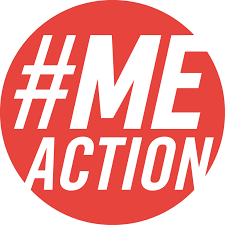The MEAction Network
#MEAction (The Myalgic Encephalomyelitis Action Network) is a worldwide ME/CFS patient advocacy group co-founded May 12, 2015 by Jennifer Brea and Beth Mazur.
Its focus is on empowering patients to take action to improve the research and treatment situation, through local affiliate groups in countries around the world. #MEAction runs special interest groups focused on science & research, public education and press relations.
History[edit | edit source]
#MEAction began in 2015 with co-founders Beth Mazur and Jen Brea. In 2016, Ben Hsuborger was hired as Advocacy Director, Jaime Seltzer was hired as Managing Editor, and Adriane Tillman as . Seltzer worked at the Stanford Genome Technology Center under Dr. Ron Davis before returning in 2018 in the role of Director of Scientific and Medical Outreach, later Scientific Director. Laurie Jones was brought on as Executive Director, Holly Lanham as Social Media Coordinator, Erin Roediger as Programs and Campaigns Director, Steven Moloney as Video and Communications Manager, and Marynka Marquez as Development Coordinator.
#MEAction began as a grassroots movement with the goal of making advocacy more accessible by leveraging technology that was not yet standard at the time, like videoconferencing software and Slack. In 2016, #MEAction formed the first #MillionsMissing protests. A 'test run' of #MillionsMissing ran in twelve cities worldwide in 2016; later in the same year, the protests expanded to include over a hundred events, local and virtual, to fight for better government research funding, accessible clinical care, and broader recognition of ME.
Notable projects[edit | edit source]
The Millions Missing protests were created by MEAction.
MEpedia was launched by MEAction.
A number of pandemic-related projects and materials were created by #MEAction, including:
- The Disinformation Guide - #MEAction knew a wave of disinformation was about to hit during the pandemic. In April 2020, #MEAction created a guide to spotting and responding to healthcare-related disinformation.
- The Pacing Guide - In response to the likely surge of infection-associated chronic illness, #MEAction created a guide to pacing for the newly-diagnosed in early 2020. Subsequently, #MEAction partnered with Long COVID Families to create the Pediatric Pacing Guide, and with the Patient-Led Research Collaborative (PLRC) to create the Clinician's Pacing Guide
- The Hospitalization Kit - #MEAction created two handouts for people with ME who face hospitalization due to COVID infection, including the Hospitalization Checklist and the Hospital Form.
In 2023, #MEAction produced a Concise Clinical Review in Mayo Clinic Proceedings as part of an grant from the Society to Improve Diagnosis in Medicine. This project also funded the co-creation of a diagnostic and treatment algorithm and edits to Mayo's public-facing page on ME/CFS.
CFSAC[edit | edit source]
MEAction became a non-voting liaison representative to the Chronic Fatigue Syndrome Advisory Committee (CFSAC) for the term June 2017 to June 2019. CFSAC, an advisory committee to the US Office of the Assistant Secretary for Health, allots three seats to patient advocacy groups.
Opposition to GET and CBT[edit | edit source]
MEAction UK has demanded "an immediate end to the use of GET and CBT."[1] The UK treatment guidelines for ME/CFS, known as the NICE guidelines are currently under review, but MEAction has demanded an interim change to the existing guidelines to stop the use of graded exercise therapy (GET) and cognitive behavioral therapy (CBT) before the new guidelines are published.[1]
Actions[edit | edit source]
PACE trial[edit | edit source]
US Congressional Outreach[edit | edit source]
Centers for Disease Control and Prevention (CDC)[edit | edit source]
- Jul 29, 2018, CDC Revises its Information on ME MEAction report on the CDC July 2017 and July 2018 website updates.[2][3] Recommendations for the CDC's ME/CFS page have been created from patient feedback on the updates as well as asking for further patient input.
Tools[edit | edit source]
Petitions[edit | edit source]
Medical & Scientific Fact Sheets[edit | edit source]
Organization[edit | edit source]
Learn more[edit | edit source]
See also[edit | edit source]
Online presence[edit | edit source]
References[edit | edit source]
- ↑ 1.0 1.1 #MEAction (July 1, 2018). "Parliament Plays NICE - #MEAction". Retrieved November 14, 2018.
- ↑ Trial By Error: The CDC Drops CBT/GET - Virology Blog
- ↑ Myalgic Encephalomyelitis/Chronic Fatigue Syndrome - CDC.gov


